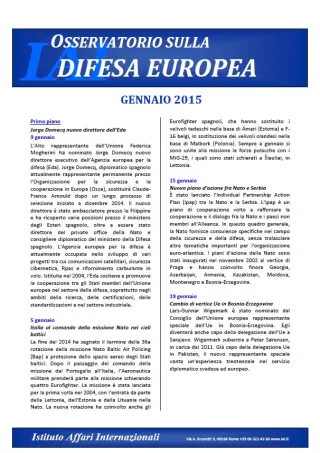Titolo completo
Observatory on European defence, February 2006
4 February 2006
Europe - Non Proliferation, Iran
On 4 February the Board of Governors of the International Atomic Energy Agency (IAEA) adopted (with the 5 permanent members of the UN Security Council in favour) the draft resolution to report the Iranian issue to the UN Security Council, submitted by the EU-3 (France, Germany, United Kingdom, plus High Representative Solana), responsible for the Paris agreement with Teheran of November 2004.
9-10 February
Informal meeting of the NATO Defence Ministers - Nato Response Force, Afghanistan and Balkans
An informal meeting of the Defence Ministers of the Atlantic Alliance dedicated to the development of capabilities and the military missions, was held in Taormina (Italy).
The Full operational capability (FOC) of the Nato Response Force (NRF), the rapid reaction force of more than 20,000 men deployable in 5 days from the activation order, will be reached in early 2007, although some NRF components have already been used in civil protection operations.
Concerning the funding of the NRF missions, there is no agreement between member states in favour of a base of common costs and those that already provide for the deployment of their own forces do not intend to risk a duplication of spending.
From 10 to 28 February, Eurocorps, the multinational force formed by France, Germany, Spain, Belgium and Luxembourg, conducted an exercise involving 17 nations. From July 2006 to January 2007, the land force of NRF will be commanded by the Eurocorps general Headquarters.
Concerning the NATO ISAF mission in Afghanistan, Ministers reaffirmed their willingness to expand the mission to the south of the country, as approved last December by the North Atlantic Council (NAC), foreseeing an increase of troops from the current 9,000 to about 16,000 men in spring 2006.
Previously, on 3 February, US Secretary of Defence Rumsfeld expressed his intention to decrease the US troops based in Kosovo, and called on NATO Allies to take on more responsibility. Currently the NATO KFOR mission in Kosovo includes about 16,000 men of which 1,700 Americans.
10-11 February
EU-NATO - Humanitarian intervention in Algeria
Upon the request of the United Nations, the EU and NATO intervened in Algeria with aid for the population hit by torrential rains.
The Union coordinated, through the Monitoring and Information Centre (MIC) of the DG Environment of the European Commission, the civil protection means made available by member states. It is the first time that military means (airlift) are expressly requested through the MIC for a civil rescue operation.
These flights, carried out in particular by France, Italy and Portugal, as part of the EU civil protection mechanism, were coordinated by NATO through its Euro-Atlantic Disaster Response Coordination Center (EADRCC).
21 February
EU Justice and Home Affairs Council - Countering International Terrorism
On 21 February the EU Justice and Home Affairs Council (JHA) met to deal with several issues related to the fight against international terrorism.
It approved the proposal for the Directive on telecommunications data retention submitted by the European Commission. Data may be retained from 6 to 24 months and access will be granted only to competent authorities designated by member states.
Instead member states did not reach an agreement on the proposal for the framework decision for the implementation of the European Evidence Warrant, especially because of lack of the definition at Community level of some crimes such as terrorism.
Finally the Council adopted a Community Code to develop an integrated system for EU border management, to which the newly established European Agency for the Management of Operational Cooperation at the External Borders of the Member States of the European Union (FRONTEX) will contribute.
27 February
EU General Affairs and External Relations Council
The EU General Affairs and External Relations Council (GAERC), decided to extend Aceh Monitoring Mission (AMM) until 15 June 2006. The mission, which the EU carries out in cooperation with some states of the region, is responsible for monitoring the peace agreements between the government and the separatist guerrillas of the Indonesian province of Aceh. The mission started on 15 September and was supposed to end on 15 March 2006.


